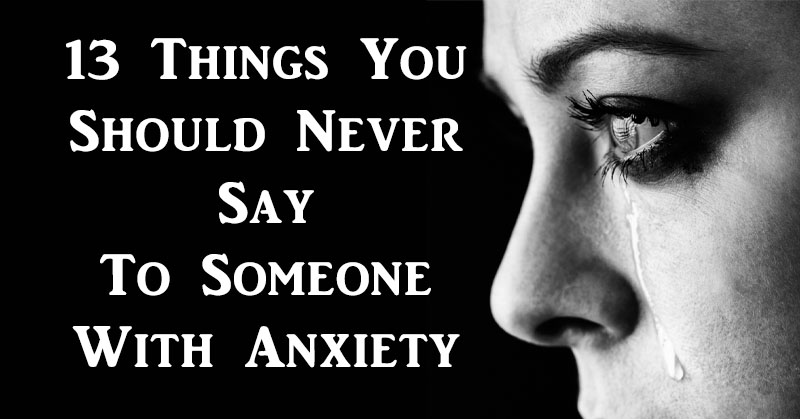Anxiety disorders, which affect 18% of the total U.S. population, are a real pain to deal with – and not just for the sufferer.
Knowing how to deal with a family member or loved one who suffers from anxiety comes with quite a steep learning curve. You have to realize that your words aren’t just sounds that fall on your loved one’s ears. They can be daggers that pierce right through and latch onto their insecurities.
With this post, let’s take a look at 13 phrases that, while they might seem helpful, can do an incredible amount of damage to an anxiety sufferer.
13 Things You Should Never Say To Someone With Anxiety
1. “A lot of people have it worse.”

You might think this will cause your anxious loved one to suddenly realize how much they have to be thankful for. You might think this phrase will change their psyche and put them more at ease.
It won’t.
In reality, what your loved one will hear is, “You’re not doing enough to be happy. You’re ungrateful and that’s why you feel this way.”
Instead, try showing your loved one exactly what they have to be grateful for by saying, “I appreciate and love you.”
Let them know they’re valued and they have a friend/family member that cares for them.
2. “You should try meditating.”
Meditation can work wonders… for some people.
There is no one-size-fits-all solution to anxiety. Pointing your loved one in a direction that may not work can lead to frustration in the long run.
Instead, ask what brings them peace. Ask what they enjoy. There are a number of ways to go about this, but the bottom line is that you should help them develop their own plan instead of just plopping a solution in front of them.
3. “Everything will be alright.”

Anxiety can create serious illusions. Your loved one is probably very aware that their feelings are likely caused by their disorder. And believe me, they’ve tried to talk their way out of it. They’ve probably told themselves ‘everything will be alright’ multiple times, only to wind up in a similar anxious spot not long after.
4. “Just be happy!”
It’s a nice thought that someone can just decide to be happy and go on to have a wonderful day. But things don’t quite work like that. If they did, we wouldn’t have disorders like anxiety!
Instead, try asking your loved one what you can do to make them feel happier. This places power in their hands and allows them to communicate their feelings and see results.
5. “It’s all in your head.”

Yes, anxiety is a disorder filled with problems that exist solely in one person’s mind. But focusing on that fact puts an anxiety sufferer in a state of conflict where they doubt their feelings.
Instead, try helping your loved one take their mind off anxiety, even for just a little bit by taking them out or engaging in an activity they enjoy.
6. “What do you have to be anxious about?”
Here’s one that tends to pop up a lot when people first share their anxiety with loved ones.
I get it – you’re probably in a bit of shock, as your loved one was probably quite good at hiding their anxiety in the past.
But this is a phrase that does a lot of damage. It’s really condescending and can trivialize the anxiety sufferer’s struggles.
Instead, ask your loved one if they’d like to talk about what’s got them anxious. Don’t assume you know what’s going on – let them speak if they’d like to.
7. “I know how you feel.”

The truth is that you probably don’t. Even if you suffer from an anxiety disorder yourself, your experience is likely different from that of anyone else.
Instead, ask your loved one how they’re feeling. Ask them what’s on their mind and how they manage to cope with their anxiety day after day. Let them do the describing.
8. “Here, have a drink.”
Drinking might seem to reduce anxiety for a little bit. But those who are dealing with an anxiety disorder have a high potential for alcohol abuse.
You should aim to be the outside voice of reason with your loved one. Don’t encourage them to do anything destructive or potentially addictive.
9. “So… When are you going to get help?”

There’s nothing wrong with suggesting that someone with anxiety go and seek professional help if you think they need it.
But don’t be pushy with them after the fact. Therapy can be a very invasive process and it’s important that people only begin when they’re ready. Don’t add another thing for them to be anxious about.
10. “Why won’t you tell me what’s wrong?”
When your loved one is dealing with anxiety, there are going to be times where you feel powerless. You can’t escape it. Instead of making your loved one feel guilty about not communicating their feelings, try to pay closer attention to them so you can learn what to look out for in regards to anxiety attacks.
Nervous behaviors like nail-biting, smoking and excess drinking can all be indicative of distress.
11. “Why are you ignoring me?”

There will be times that your anxiety-plagued loved one just wants to disappear. Don’t take it personally as this will give them yet one more thing to worry about.
Yes, it will require some patience on your part. But next time your loved one is open to talking, politely let them know that you are more than happy to give them space when needed. This could make them feel a lot more comfortable about telling you when they need said space.
12. “It’s just a phase.”
You might be tempted to pull this one out in an effort to comfort someone such as a teenager or young adult.
Yes, their anxiety might be heavily influenced by environmental factors. But there’s more to it than that. In addition to one’s environment, there are genetics, brain chemistry and medical conditions at play.
Don’t assume you know everything about your loved one’s anxiety; trained professionals can spend years trying to figure out exactly what’s wrong.
13. “Oh, here we go again…”

You might think that by making light of your loved one’s anxiety, you’re helping. Really, you’re just making it very unlikely that they will ever express their feelings to you again.
Remember that someone with anxiety will likely analyze things you say very deeply. Choose your words carefully, and when in doubt, choose compassion.
Have a look at this video from David’s Facebook page that showcases an artist’s brilliant attempt at what it’s like to live with anxiety and depression.
https://www.facebook.com/DavidAvocadoWolfe/videos/10153302380081512/
Sources:
Medical News Today
HelpGuide.org
CalmClinic.com
Social Anxiety Institute
ADAA.org


